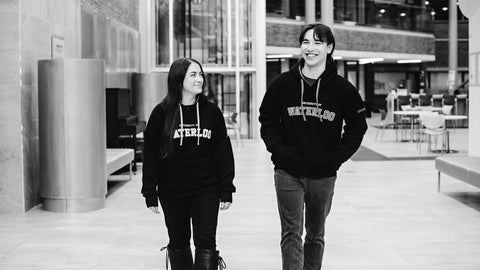The Faculty of Science is the first faculty at the University of Waterloo to have an embedded Indigenous Initiatives Office. Science Indigenous Initiatives serves as a central hub for First Nations, Inuit, and Métis students, researchers, faculty, and staff, along with allies within the Faculty of Science. Our office works to provide the community with guidance, support, and resources to strengthen our shared vision of reconciliation.
In line with the University’s Strategic Plan and Indigenization Strategy, Science Indigenous Initiatives strives to address the underrepresentation of Indigenous people and to increase specialized support within the Faculty. Our office plays a leadership role in identifying systemic and systematic changes that move beyond the Calls to Action to create a more inclusive environment for Indigenous presence and learning.
We provide research and learning consultations, workshops and training, and individualized support for self-identified Indigenous people and allies. Contact us for more information.

Current Initiatives
- The Faculty of Science Indigenous Student Advisory Committee centres the Indigenous student voice and experience within the Faculty. All self-identified Indigenous undergraduate and graduate students within the Faculty are welcome to join. Please contact Savannah Sloat for more information.
- The Faculty of Science Indigenous Working Group is an advocacy group within that provides recommendations to the Faculty departments and schools. For more information, or to join the Working Group, please contact Savannah Sloat.
- Faculty Association Indigenous Priorities Action Committee helps to advocate for changes at the University of Waterloo to improve the experiences of Indigenous faculty, staff, and students. Contact Laura McDonald if you are interested in getting involved.
Resources
- The Office of Indigenous Relations is a campus-wide office that provides regular events and workshops for all University of Waterloo community members, as well as resources and supports to Indigenous faculty, staff, and students.
- A comprehensive list of Bursaries, Awards & Scholarships for Indigenous students is available through the Office of Indigenous Relations.
- The Waterloo Indigenous Student Centre (WISC) provides supports to Indigenous students through a wholistic lens: cultural, academic, well-being, and social engagement. It is supportive, respectful, inclusive, and welcoming for all Indigenous students on campus.
- The University of Waterloo Library has created an Indigenous Research Guide to help UWaterloo researchers identify Indigenous-related resources that have been marginalized, erased, and ignored because of dominant Western practices in education, scholarship, and library science.
Territorial Acknowledgement
The University of Waterloo acknowledges that much of our work takes place on the traditional territory of the Neutral, Anishinaabeg and Haudenosaunee peoples. Our main campus is situated on the Haldimand Tract, the land granted to the Six Nations that includes six miles on each side of the Grand River. Our active work toward reconciliation takes place across our campuses through research, learning, teaching, and community building, and is centralized within the Office of Indigenous Relations.
Departments, offices and individual members of the University are strongly encouraged to acknowledge the land we occupy in any or all of the following ways:
- While the Waterloo territorial acknowledgement is placed across all website footers associated with main campus, departments and units are encouraged to create supplementary acknowledgements that speak directly to their work and those engaged in this work
- Ground the acknowledgement with action and connect it to current work in your discipline/area
- Add the acknowledgement statement to UWaterloo email signature
- Add the acknowledgement statement to course syllabi
- Make the acknowledgement statement at commencement of courses, meetings, conferences, and presentations
For general inquiries, please contact: sciindig@uwaterloo.ca.
